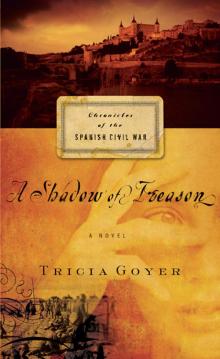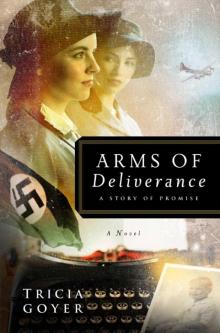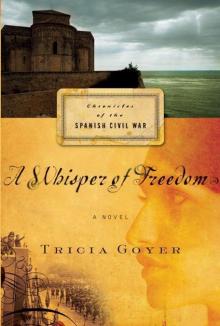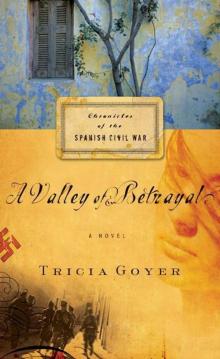- Home
- Tricia N. Goyer
Shadow of Treason
Shadow of Treason Read online
A Shadow of Treason
Other Books by Tricia Goyer
Book One: Chronicles of the Spanish Civil War
A Valley of Betrayal
A Novel
ISBN-10: 0-8024-6767-9
ISBN-13: 978-0-8024-6767-6
Caught in the middle of what is quickly becoming a bloody battleground, Sophie takes refuge with a brigade of international compatriots. Through the use of her fiancé’s camera and her own art, she pledges to make the plight of the Spanish people known around the world.
From Dust and Ashes
A Story of Liberation
ISBN-10: 0-8024-1554-7
ISBN-13: 978-0-8024-1554-7
It is 1945 and Helene is the wife of a Nazi guard who has fled to avoid arrest. Overcome by guilt, she struggles to find her own liberation—from spiritual bondage and sin.
Night Song
A Story of Sacrifice
ISBN-10: 0-8024-1555-5
ISBN-13: 978-0-8024-1555-4
Inspired by a little-known but true story, Young Jakub plays in the orchestra started by the prisoners at one of Hitler’s death camps. Melody begets hope in this tale of survival.
Dawn of a Thousand Nights
A Story of Honor
ISBN-10: 0-8024-0855-9
ISBN-13: 978-0-8024-0855-6
Dan is shot down and captured by the Japanese while Libby is called into the service as one of the first female fighter pilots in a time of war. Their love is tested across an ocean.
Arms of Deliverance
A Story of Promise
ISBN-10: 0-8024-1556-3
ISBN-13: 978-0-8024-1556-1
At the New York Tribune, Mary and Lee are competitors as war breaks out. But then Mary’s coverage of a bombing in Germany leads to new adventure and a narrow escape.
Find these now at your favorite local or online bookstore.
www.MoodyPublishers.com
A Shadow of Treason
A N O V E L
T R I C I A G O Y E R
MOODY PUBLISHERS
CHICAGO
© 2007 by
TRICIA GOYER
All rights reserved. No part of this book may be reproduced in any form without permission in writing from the publisher, except in the case of brief quotations embodied in critical articles or reviews.
All Scripture quotations, unless otherwise indicated, are taken from the King James Version.
Scripture quotations marked NIV are taken from the Holy Bible, New International Version®. NIV®. Copyright © 1973, 1978, 1984 by International Bible Society. Used by permission of Zondervan. All rights reserved.
Cover Design: Chris Gilbert, Studio-gearbox
Cover Image: Taylor S Kennedy/National Geographic, Stockbyte and
Bettmann/CORBIS
Interior Design: Ragont Design
Editor: LB Norton
Library of Congress Cataloging-in-Publication Data
Goyer, Tricia.
A shadow of treason / Tricia Goyer.
p. cm.— (Chronicles of the Spanish Civil War)
ISBN 978-0-8024-6768-3
1. Spain--History—Civil War, 19361939—Fiction. 2. Americans—Spain—
Fiction. I. Title.
PS3607.O94S53 2007
813'.6--dc22
2007020266
ISBN: 0-8024-6768-7
ISBN13: 978-0-8024-6768-3
We hope you enjoy this book from Moody Publishers. Our goal is to provide high-quality, thought-provoking books and products that connect truth to your real needs and challenges. For more information on other books and products written and produced from a biblical perspective, go to www.moodypublishers.com or write to:
Moody Publishers
820 N. LaSalle Boulevard
Chicago, IL 60610
1 3 5 7 9 10 8 6 4 2
Printed in the United States of America
Contents
Characters
Chapter One
Chapter Two
Chapter Three
Chapter Four
Chapter Five
Chapter Six
Chapter Seven
Chapter Eight
Chapter Nine
Chapter Ten
Chapter Eleven
Chapter Twelve
Chapter Thirteen
Chapter Fourteen
Chapter Fifteen
Chapter Sixteen
Chapter Seventeen
Chapter Eighteen
Chapter Nineteen
Chapter Twenty
Chapter Twenty-One
Chapter Twenty-Two
Chapter Twenty-Three
Chapter Twenty-Four
Chapter Twenty-Five
Chapter Twenty-Six
Chapter Twenty-Seven
Chapter Twenty-Eight
Chapter Twenty-Nine
Chapter Thirty
Chapter Thirty-One
Chapter Thirty-Two
Chapter Thirty-Three
Epilogue
Dear Reader,
A few years ago when I was researching for my fourth World War II novel, I came across a unique autobiography. One B17 crewmember I read about claimed to have made it out of German-occupied Belgium after a plane crash due, in part, to the skills he picked up as a veteran of the Spanish Civil War. Reading that bit of information, I had to scratch my head. First of all, I had never heard of the war. And second, what was an American doing fighting in Spain in the late 1930s? Before I knew it, I uncovered a fascinating time in history—one that I soon discovered many people know little about. This is what I learned:
Nazi tanks rolled across the hillsides and German bombers roared overhead, dropping bombs on helpless citizens. Italian troops fought alongside the Germans, and their opponents attempted to stand strong—Americans, British, Irishmen, and others—in unison with other volunteers from many countries. And their battleground? The beautiful Spanish countryside.
From July 17, 1936–April 1, 1939, well before America was involved in World War II, another battle was fought on the hillsides of Spain. On one side were Spanish Republicans, joined by the Soviet Union and the International Brigade—men and women from all over the world who volunteered to fight Fascism. Opposing them were Franco and his Fascist military leaders, supported with troops, machinery, and weapons from Hitler and Mussolini. The Spanish Civil War, considered the “training ground” for the war to come, boasted of thousands of American volunteers who joined to fight on the Republican side, half of whom never returned home.
Unlike World War II, there was no clear line between right and wrong, good and evil. Both sides committed atrocities. Both sides had deep convictions they felt were worth fighting and dying for.
So on one side we have: the new democratic Spanish government, Communists, Socialists, the “Popular Front,” anarchists; free thinkers, artists, musicians; peasants, workers, unions; the Republicans, the International Brigade, Thaelmann Battalion (German Communists), La Marsellaise (French-British battalion), “the people,” the Basques of northern Spain, Basque president Aguirre, “the Reds,” Fernando Valera, Steve Nelson. The Soviet Union backed the Republicans. A number of volunteers made their way to Spain to fight under the Republican banner, including the English-speaking Abraham Lincoln Brigade from the United States.
On the other: General Franco, General Mola, the Nationalist Rebels, Fascists, Hitler’s Nazi forces, Mussolini’s Italian troops, the Spanish military, Moroccan cavalry, the established Catholic Church, the monarchy, “right-wingers,” wealthy landowners and businessmen. Fascist Germany and Italy supported Franco.
During the Spanish Civil War, terror tactics against civilians were common. And while history books discuss the estimated one million people
who lost their lives during the conflict, we must not forget that each of those who fought, who died, had their own tales. From visitors to Spain who found themselves caught in the conflict, to the communist supporters. Basque priests, and Nazi airmen . . . each saw this war in a different light. These are their stories.
Tricia Goyer
Characters
Sophie Grace, twenty-five, American, aspiring artist, in Spain to join her fiancé
Eleanor Winslow, (deceased) American author of letters given to Sophie
Michael, her fiancé
Hector, a matador and friend of Michael’s in Bilbao
Paulo, their friend from Madrid
Cesar, a bodyguard
Maria Donita, young Spanish woman whom Sophie feels is a threat to her relationship with Michael
Emilio, now her husband
Benita Sanchez, friend of Michael
Luis, Benita’s husband (mentioned
Walt Block, newspaper correspondent from New York who befriends Sophie and helps her get into Spain, aka James
Kimmel, a pro-Franco reporter
Lester McGovern, a British agent
Derrick Wilson, a co-conspirator
José Guezureya, friend of Michael
Ramona, José’s wife
Juan, José’s father
Pepito, fellow ranch hand
Ritter Agler, pilot in German air force
Isanna, woman he desired, who married another
Hermann Göring, German general
Monica Schull, American, “assistant spy”
Philip Stanford, American, soldier in volunteer Abraham Lincoln Brigade
Attis Brody, Philip’s best friend, deceased
Charles, an American trench mate
Deion Clay, African-American, also in Abraham Lincoln Brigade
Father Manuel Garcia, a priest in Guernica
Sister Josefina, from the convent in Guernica
Armando, childhood friend of Manuel’s
Nerea, Armando’s wife
Berto, young Spanish man in Paris
Petra Larios, daughter of wealthy family of La Mancha, left without family
Ruy and Rafael, her cousins
Edelberto, boy she met on holiday; cousin of Michael
José Antonio Aguirre, first Basque president
Steve Nelson, Croatian-born leader of communist party in U.S.
Show the wonder of your great love,
you who save by your right hand
those who take refuge in you from their foes.
Keep me as the apple of your eye;
hide me in the shadow of your wings
from the wicked who assail me,
from my mortal enemies who surround me.
Psalm 17:7–9(NIV)
Chapter One
No one told the rescuers not to talk, yet instinctively they sifted through the bits of brick and shards of glass as quietly as possible, alert for the slightest sound of human life beneath the rubble of the tailor shop.
Deion Clay paused for a minute and wiped his brow with a soot-blackened handkerchief. He refused to look at the other buildings surrounding him, reduced to heaps. The sight caused a deep ache in his gut. All he knew was underneath this pile a few families had taken refuge in the basement.
Deion had been walking through the streets sometime in the night, offering help to the injured, when he heard the cries for help. And although they had fallen silent for the past few hours, he clung to the faintest hope. It was all he had.
Though hundreds of rescuers had swarmed the area last night, fighting the flames, most citizens from Guernica had since bundled up every meager possession they could scrounge and headed out of town with oxcarts carrying the children and old women. Perhaps twenty still worked alongside Deion, their skin made even blacker by soot than his natural color. They continued to dig, refusing to give up hope for the missing wife, son, or brother.
The attack had been devastating. Bombers had filled the skies in two waves that lasted nearly an hour each. Smoke continued to sting his eyes, and he again wiped away the tears. What the bombs hadn’t destroyed, the fire had. Yet Deion understood why the handful of workers stayed, and he vowed to stay with them. How could one walk away from his whole existence without knowing that every last stone was overturned? He knew they’d give their all in hope of one more person being pulled from the rubble alive.
As Deion sifted through the debris, he sifted his motives as well. To find life under the wreckage meant he ’d come for a purpose. To save a life would prove Spain hadn’t been a mistake after all.
He sucked in a deep breath of recommitment and surveyed the rubble for the line of least resistance. So far they had excavated several feet of a narrow hallway leading to the basement. They were on the right track. They had to be.
“Here, amigo.” An older Spanish man handed him a shovel.
Digging in, Deion worked to dislodge the powdered plaster and brick. He scooped a pile and dumped it into a dented pail on the ground behind him. Without a word, the Spanish man passed it back down the line, where another man dumped it into the street.
The men around him scurried around as one, not needing words. The ragged line moved like the black ants Deion had watched as a boy. Working in unison under the intense Mississippi sun, they had quietly moved mounds of dirt thousands of times their own weight. These men seemed to be doing the same. Their wide eyes showed their emotions fluctuating between fear, disbelief, and weariness. Just yesterday, before the German planes swept over the small Spanish town, they’d been bankers, farmers, and schoolteachers. Now that world no longer existed.
Just as America no longer seemed to exist to Deion. The land of freedom, of opportunity. The land where men walked the street without ears pricked for the slightest sound of enemy bombers. Such peace seemed like something from a child’s storybook.
Sure, things had been tough back home, with the recent economic depression and all, but it was nothing like this. And, he hoped, it never would be. Deion shook his head, unable to imagine New York City or Chicago under attack with bankers and businessmen sifting rubble caused by enemy bombs. If he did his job well—if all the volunteers for liberty did—America would stay safe.
Deion turned to see some men coming toward him carrying wooden beams, broken and splintered. One man worked the beams into place between the ground and the top of ceiling to support the slow advance of those digging.
The tension in the pit of his stomach tightened with each strike of the shovel’s tip. One wrong move could cause the whole thing to collapse onto the people still trapped underneath, crumbling like a tower of playing cards.
One man’s soft moan grabbed Deion’s attention. He reached under a brick near Deion’s feet and pulled out a soggy brown paper package. With trembling fingers he untied the blackened string, revealing a gray suit coat. He said something in Spanish that Deion didn’t understand. Had the coat belonged to a brother, a friend?
A choking sob issued from the man’s throat. With a louder sob, he pressed his face into the lapel of the jacket as his trembling, clawlike fingers gripped the fabric.
The gray suit coat reminded Deion of one his friend Jeb had often worn while collecting money for Spain in the subways of New York. Some gave to the Communist cause, nickels and dimes mostly. But they wasted much more playing craps or buying drinks at the corner bar. And what difference would it have made if all those who talked of Spain had actually come? Would fifty, a hundred, five hundred more men have made the difference? Could scenes like this have been prevented?
A moaning wind rocked the branches of a scarred tree next to the shop and swept down into the rubble, caressing Deion’s sweat-covered face. He pushed his shovel in deeper, then paused. He held up a hand, stilling the others.
A voice blended with the wind’s moaning. It cried again for help. Yes, it was a woman’s voice, joined by a baby’s cry.
The man next to Deion called to her. Even though Deion coul
dn’t understand all the words, he assumed the man was telling her to save her energy. No doubt they all realized it was possible the limited air supply could be used up before those trapped were reached. The baby’s cries continued. A few minutes later they finally stilled, and Deion hoped the mother had comforted the infant in her arms. He refused to consider the alternative.
They pressed on to what Deion assumed was the door to the basement. Though it was still in its frame, it was twisted and crushed. Cautiously he pushed against it, gaining mere fractions of an inch with each groaning effort. When he could finally see past it, four faces peered up at him. Two women, a young girl, and a baby blinked at him, as if trying to focus. Deion didn’t know if their wrinkled brows were due to the sunlight or the color of his skin. They’d most likely never expected a colored man to rescue them, especially after hearing the horrible tales of the Moors from Africa who fought with the Nationalists.
The woman studied Deion’s face for a moment, then slowly blinked her eyes and handed him the baby. He snuggled the child to his chest, and a warmth surged through his frame. He ’d never felt more alive.
But before he had a chance to hand the baby over, a loud rumbling in the distance filled his ears. Enemy ground forces. They could advance into the town by tomorrow. Or maybe sooner.
“Come.” Deion reached his hand toward the woman, and though she didn’t understand his English words, she reached for his hand and climbed out. The other woman and child followed— out of the darkness and into the light.
Chapter Two
Sophie Grace lifted the thick blackout curtain, made from cloth once bought for nuns’ habits, and allowed the red-tinted sunlight into the supply room. A recurring image filled her mind—the picture of the small child lying limp in her mother’s arms. But it wasn’t a nightmare. It was yesterday’s memory, and one she couldn’t shake.

 Shadow of Treason
Shadow of Treason Arms of Deliverance
Arms of Deliverance Whisper of Freedom
Whisper of Freedom Dawn of a Thousand Nights
Dawn of a Thousand Nights Valley of Betrayal
Valley of Betrayal